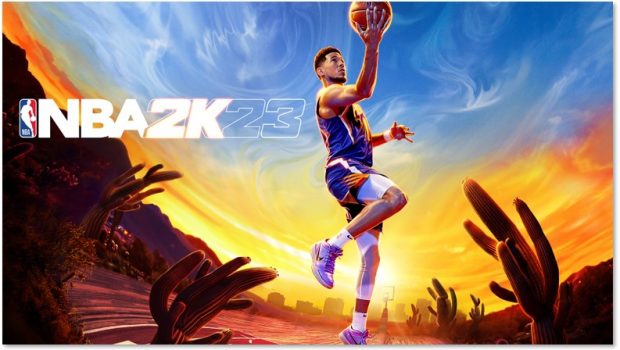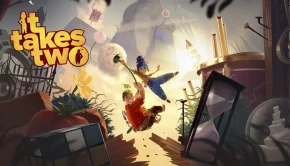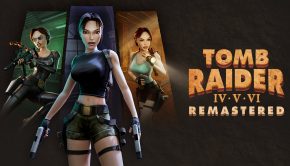NBA 2K23: Gameplay Enhancements
NBA 2K23 is nearly here and it features gameplay enhancements that elevate the competitive intensity in all facets. The main pillar for us this year can be summed up with one word: Authenticity. The team worked hard to create as much parity as possible in the on-court gameplay between Current and New Gen. Below, we’ve detailed all there is to know about the updates coming in the latest iteration of the NBA 2K franchise.
.
OFFENSIVE GAMEPLAY
The defense was a point of emphasis in last year’s game, but NBA 2K23 is so jam-packed with new features and upgrades on the offensive end of the floor that it’s a perfect starting point. NBA 2K22 was a banner year for perimeter players: small guards had a slew of advantages over their taller counterparts, and outside shooting reigned supreme in online matches. Thinking about how we could bring more authenticity to our game, we looked at how virtual games were playing out compared to the real-life NBA, and it was clear that we needed to give more love to slashers who love to finish at the rim. This meant expanding the tools for attacking the basket.
UPGRADED PRO STICK
The most obvious upgrade is the addition of new gesture combos to the Pro Stick. Internally, we refer to the new mechanics as double throws (flicking the Pro Stick in a direction, letting it go back to center, and then quickly moving the Pro Stick back in the same direction) and switchbacks (flicking the Pro Stick in a direction, letting it center, and then quickly moving the Pro Stick in the opposite direction). These new gestures introduce a lot of new weapons for both shooting and ball handling.
FLEX ON THE RIM
For dunking, the metered skill dunks from NBA 2K22 (ability to force difficult dunks in traffic with a timed shot meter) return, but the new commands allow us to expand the dunking controls to let you dunk exactly how you want without accidentally firing off a skill dunk you weren’t expecting. When driving to the basket with the Sprint trigger held, the new Pro Stick control map for dunks is as follows:
- UP = Two-Hand
- RIGHT = Strong Hand
- LEFT = Weak Hand
- DOWN = Rim Hang
- UP-UP = Flashy Two-Hand
- DOWN-UP = Flashy One-Hand
- UP-DOWN = Normal Skill Dunk with meter
- DOWN-DOWN = Rim Hang Skill Dunk with meter
You’ll notice with this new map, you now have control over rim hangs. For New Gen, we’ve taken that control to an all-new level with physics-based simulated rim hangs! This is an incredibly entertaining and wonderfully complex piece of tech that’s been in development for a couple of years now. It allows you to control when and how you hang on the rim after a dunk.
The controls are simple. Use one of the new rim-hang dunk gestures mentioned above when driving toward the hoop, but keep the Sprint trigger held when the player gets their hands on the rim. You’ll hang indefinitely as long as you keep the trigger held, and you can use the Left Stick to adjust the momentum of your swinging body and the Right Stick to pull yourself up on the rim. This is all done through a physical simulation, as opposed to canned animations—it looks and feels amazing. It’s one of the most fun things to do in the City (available on New Gen only), but watch out for techs if you hang too long in NBA games.
FINESSE YOUR WAY TO THE RACK
For slashers who want to finish with a little more finesse, double throw gestures are used for hop-step layups while switchback gestures are used for euro-step and cradle layups, which feels very natural. A simple hold left or right will perform an all-new set of quick scoop layups. These are great, especially for small guards who want to quickly flip the ball up around defenders before they can react and block the shot.
For the bigger/stronger players, you’ll also experience a lot of new contact layup content that properly shows what should happen when players like Giannis Antetokounmpo plow through everyone in their path.
In addition, we’ve added several new layup packages for both New Gen and Current Gen, including Devin Booker, Joel Embiid, Allen Iverson, Magic Johnson, Nikola Jokic, Zach LaVine, Ja Morant, Sue Bird, Diana Taurasi, and more!
For post players, double throws can be used for post drop steps and hop shots. Switchback gestures will give you shimmy shots and hooks. There are a bunch of new signature post shots and hooks to choose from this year as well.
COMBINE MESMERIZING SKILL MOVES
Dribbling in NBA 2K has taken on a life of its own and has become a sort of game within the game. Ball handlers are going to enjoy ‘combo-ing up’ in NBA 2K23, as the new gesture combos give you even more options for your arsenal. Switchback gestures will now perform dedicated signature double cross and hesi (hesitation) cross combo moves that you can assign as part of the Moving Crossover signature package—which has grown from 15 options to 28. Learning the speed of your stick throws and the timing of your signature animations is especially important now.
You can chain your player’s normal signature size-ups by rocking the Pro Stick back and forth rhythmically. Rapid double throws will give you the aforementioned new combos. And flicking the Pro Stick back and forth repeatedly will give you a whole different set of animations called Signature Combos that look incredible.
Another major dribbling change is the introduction of “attacking size-ups.” One of the things we wanted to improve with dribbling in NBA 2K was that, while the size-up moves looked cool, they weren’t very useful. The new attacking size-ups provide a lot more side-to-side movement and are much better at forcing the defense to drop and shift, allowing you to bait them one way and then attack the other—something all great ball handlers do so well in real life.
While it’s fun to clown your opponents with a flurry of flashy dribbles, we don’t want to encourage players to dribble the entire shot clock out while their teammates fall asleep. Energy will deplete much quicker when spamming too many moves together, so it’s important to be efficient and not “play with your food” too long. There’s a long list of size-ups to learn on paper, but they’re all very simple and feel natural in practice. Jump into 2KU Freestyle Practice to play around with different stick throw timings and you’ll get the hang of it after a few minutes.
ADRENALINE BOOSTS
Another new feature to prevent overdribbling is the concept of Adrenaline Boosts. There are three available boosts per player, per possession, shown as three small bars under the stamina meter.
Boosts are consumed every time you perform a hard go or explosive sprint launch. Once your three boosts are gone, you’ll notice that your speed and acceleration decrease significantly for the remainder of the possession. As with dribble combos, it’s important to play smart basketball and be efficient with your movement rather than zig-zagging back and forth aimlessly trying to get around the defense.
MORE AUTHENTIC SHOOTING
Shooting also gets some nice upgrades for NBA 2K23. In NBA 2K22, success from the outside was heavily weighted toward coverage. If you could get an open look, you could balance out poor ratings and inaccurate timing. This year, we wanted a more authentic shooting model that captures the essence of a great NBA shooter’s capabilities.
The first major change is the addition of shooting attributes. Since the inception of signature jump shots in 2K basketball, animations have been more or less aesthetic but functionally the same. This year, each signature jump shot has unique shooting stats that help determine its effectiveness.
- Shot Speed – How quickly the shot gets to its ideal release point
- Release Height – How high the shot is released
- Defensive Immunity – How effective the shot is against defensive contests
- Timing Impact – Adjusts shot windows to reward good timing at the cost of an increased penalty for bad timing
We’re also adding a huge number of shot animations to choose from, over double the amount of any previous version of 2K, and they’re much more accurate to each player’s real-life jumper. For MyPLAYERs, shot animations will be gated by shooting ratings, so you’ll have to play around with all the options to figure out what works best for your skill set and playing style. We’re looking forward to seeing a lot more variety in the community’s sig shot selection with this next evolution of shots.
SHOT METERS & FEEDBACK
There are also five new shot meters to choose from, with 15 more that can be unlocked through Seasons over the coming year! Some big, some small, some above the head, some to the side, and some below the shooter. Each meter completely fills to the end, which is your ideal release point, then empties on the late side ala 2K17-2K20. The new shot meter options were a common ask from the community, so we’re sure everyone will find an option they like and then some.
You’ll also notice a subtle change to how shot feedback works this year. We use shot arcs to help indicate whether you’re early (high arc), late (flat arc), or on time (ideal arc), so by paying attention you can easily tell right away if your release is off. Also, with Shot Feedback enabled, we’re delaying the timing/coverage overlay and green release animations from coming up until the ball hits the basket. It’s a small change, but it really brings back some of the drama that the green lights sometimes lacked, and also encourages everyone to continue to play through the possession rather than giving up and getting back in transition early.
FACILITATE THE OFFENSE
For the playmakers out there, you’ll find some new tools at your disposal as well. The Lead to Basket pass makes its return to New Gen so that it works the same way as Current Gen, allowing you to simply press and hold Y/TRIANGLE to get your receiver to cut to the basket and release the button to throw the pass.
Another alternative is the new Spot Up pass mechanic. If you press and hold B/CIRCLE, the receiver you’re pointing at with the left stick will perform a quick V or flare cut to get open on the perimeter. It’s a very useful quick-hitting play to get an open look when you don’t have time to run a full-blown play for your teammate. MyPLAYERs can also equip a signature passing style to mimic some of the best floor generals of all time, including Steph Curry, Magic Johnson, Jason Williams, LeBron James, and more.
Whether you prefer to drive the lane, back defenders down in the post, or spot up from behind the arc, NBA 2K23 offers a wide variety of tools that cater to your offensive gameplan.
DEFENSIVE GAMEPLAY
As always, defense remains a huge priority for the gameplay team. We know all the offensive upgrades in the world don’t make for a fun game if there are no counters to stop them, so let’s talk about some of the great enhancements on the other end of the floor.
Shot defense received a nice overhaul for NBA 2K23. Up until last year, we used a simple shot defense calculation that looked at two specific points: the location of the defender when the shot started and the proximity to the ball at release. It worked well, but also had its shortcomings. If the defender’s hand or arm moved slightly into a bad position, right at the point of our shot release calculation, you could get a bad coverage score even though it looked like a very good contest.
This year, we’ve created a system that evaluates the defensive player’s contesting hand throughout a window of the shooting motion. This larger sample set provides way more accurate results and helps line up the coverage numbers to what players expect based on what they see happening on-screen.
ON-BALL DEFENSE
For the floor game, on-ball defensive movement and body ups received a major refresh with new content that more accurately depicts today’s 1-on-1 player interactions. You’ll also notice a new indicator on the ball handler when in guarding position. This is the new defensive shading mechanic. The three bars on the indicator represent three zones: Straight up, Shade left, and Shade right. The zone the defender’s in is shown in red. If the ball handler attempts to attack a red lane, they’ll get cut off, lose their dribble, or fumble the ball.
Great defenders can anticipate where the ball handler is attacking and will now be more clearly rewarded for it. The shading system works for both on-ball defenders guarding the perimeter as well as the post and does a good job communicating to both the offense and defense why collisions resolve the way they do.
SHOT BLOCKING
Shot blocking has been refined quite a bit this year as well. With NBA 2K22, we made a huge effort to improve block targeting and give players the ability to deter any shot that comes into the paint. For NBA 2K23, blocks have been tuned to a more realistic level, leading to much more predictable outcomes, with the right players making appropriate stops when timing their block attempts well. No more small guards pulling off LeBron James-level chase-down blocks like last year. You’ll also notice a distinct improvement in ball security for good dunkers.
In the past,it was always risky trying to pull off tomahawks and back scratchers with defenders even remotely nearby. We’ve made some changes to encourage good dunkers to use a greater repertoire of dunk packages. Feel the reward of highlight-reel dunks with significant Takeover boosts in the right situations without fear of always getting the ball knocked out on the way up. The shot blocking system also now contains “fly-by” blocks. When closing out late on perimeter shooters, the fly-by’s will do a better job trying to get a hand up while preventing defenders from slamming into the shooter and sending them to the line.
STEALS & BALL STRIPS
Ball strips are new and improved this year with tons of new content and better coverage. So if you’re a smaller defender, quick hands can be just as effective in slowing down slashers and bigs in the paint as a good shot blocker. We’ve also added failed strip contact layups to make sure defender’s steal inputs are respected instead of getting ignored.
When the ball does get knocked loose by a block or steal, you’ll see greatly improved sideline awareness during scramble plays. Pickups near the out of bounds lines are much more reliable, as are diving ball saves that throw the ball back in play. I’ve seen some amazing 50/50 ball saves that would make Dennis Rodman and Alex Caruso proud!
BADGES, BUILDS, AND TAKEOVERS
One of the first things everyone does when they pick up a new version of 2K is experiment with building a new MyPLAYER. This year, the major goals for the Player Builder were refinement, polish, and balance. You still have complete control to build any type of player you want, but the new builder ensures that all builds, regardless of size or specialty, are fun and balanced.
The 5v5 environment used last year to test work-in-progress player builds, is also now accompanied by a 3v3 environment. For New Gen players, this is especially useful if you love to hoop on the City courts and want to make sure your player can hang in the streets.
Another huge addition to the build system is that animation purchases will now be account-bound rather than specific to one save file. In other words, if you purchase an animation for your playshot build, it will then be available to equip on your slasher build, assuming your player meets all the animation’s requirements. For Current Gen users, you’re no longer limited by the pie chart build system from the last couple years as it’s been replaced with the more robust Player Builder that New Gen uses.
NEW GEN BADGE SYSTEM
The most impactful change, when it comes to building players, is in the form of a new badge system for New Gen. When looking at telemetry from previous years, we noticed that players often gravitated towards the same badges and, as a result, became a little overpowered by stacking certain badges together. This year, we’re moving to a tiered badge system. There are 16 badges per attribute category: eight in Tier 1, four in Tier 2, and four in Tier 3. Tier 1 badges are the least powerful for your player, but also cost the least amount of badge points. Costs go up as you climb the tiers and acquire the more impactful badges. The basic idea is that you’ll need to equip a certain number of badges in the lower tiers before you can equip badges in the highest.
The motive behind this change was to encourage players to make some tough choices when creating their badge recipes, make loadouts more valuable as a feature, and bring a better overall balance to the badge game in general. Along with the tiers, we’re also introducing “Core” badges, which are four unique badge slots (one in each attribute category) that can be filled with badges that don’t count toward your badge points. Each badge will have a challenge requirement that, once met, will allow the badge to be placed into a core badge slot. We also made several changes to the badges themselves, which are highlighted below:
FINISHING
- Slithery – Makes it easier to gather through traffic, avoiding collisions and strips
- Masher – Increases ability to finish inside layups over defenders
- Aerial Wizard – Ability to successfully complete alley–oops and putbacks
- Bully – Like Giannis and LeBron, able to finish strong by bulldozing through traffic
- Removed: Hook Specialist
SHOOTING
- Agent 3 – Ability to hit difficult 3PT shots off the dribble
- Middy Magician – Improved ability to knock down mid-range jumpers off the bounce or out of the post like MJ
- Amped – Reduces the shooting attribute penalties when fatigued and when moving excessively prior to shooting
- Claymore – Increases a spot up shooter’s ability to knock down catch and shoot jumpers the longer they remain stationary prior to shooting
- Comeback Kid – Improved ability to shoot perimeter jumpers when trailing in a game
- Hand Down Man Down – Makes an outside shooter even deadlier if opponent fails to get a hand in the face
- Space Creator – Formerly a Playmaking badge, it now boosts the ability to hit stepback jumpers and hop shots, and also will cause defenders to stumble more often
- Limitless Range – An old favorite returns, making shooters more effective with any shot attempt from deep 3PT range
- Removed: Chef, Hot Zone Hunter, Lucky #7, Mismatch Expert (moved to playmaking), Set Shooter, Sniper, and Limitless Spot-Up
PLAYMAKING
- Killer Combos – Improves a dribbler’s effectiveness with size-up dribble moves (basically a combination of last year’s Quick Chain and Tight Handles badges)
- Clamp Breaker – Helps ball handlers win more 1-on-1 body bump confrontations (the counter to Clamps)
- Vice Grip – Improves ball security immediately after securing a rebound, catch, or picking up the ball. Great badge for bigs!
- Mismatch Expert – Formerly a shooting badge, this badge now helps smaller guards break down taller defenders when mismatched 1-on-1
- Removed: Bullet Passer, Downhill, Glue Hands, Stop & Go
DEFENSE/REBOUNDING
- Anchor – A crucial badge for last line of defense bigs, improves ability to block and contest shots in the paint
- Boxout Beast – Helps rebounders win boxout battles on both offensive and defensive rebounding situations
- Work Horse – The Pat Bev badge that boosts your ability to hustle down 50/50 balls and play hard-nosed defense without getting tired
- Glove – Named after legendary defender Gary Payton, helps you strip players as they gather for shots and poke the ball free from ball handlers
- Challenger – Improves the effectiveness of perimeter shot contests
- Removed: Defensive Leader
TEAM TAKEOVER REDESIGN
Takeovers are special abilities you can equip on your MyPLAYER that you can activate after building up your Takeover meters. Basically, like getting hot in real life. While the primary and secondary Takeovers remain the same, Team Takeover has been redesigned.
In the last couple of versions, a player would activate Team Takeover for the entire team and make everybody hot after filling up the primary, secondary, and then Team Takeover meters in sequential order. For NBA 2K23, Team Takeover works as a cooperative team system with the entire team sharing a single meter. Each player on the team has an equal portion that they’re responsible for filling up by performing well on the court and being good teammates. Once each player has filled up their portion of the meter, Team Takeover automatically fires off for the entire team. The new design makes a lot more sense and does a better job representing what it means to be hot as a team and to take over the game as a unit.
AI GAMEPLAY
NBA 2K23 is packed with AI goodness on both ends of the floor for new gen consoles. Here are some of the highlights that the AI engineers and Da Czar have cooked up for you.
OFFENSIVE IMPROVEMENTS
The first thing we wanted to address this year was how the offensive AI uses its dribble move arsenal to attack. The goal was to make the AI more aggressive in setting up its moves, and more deliberate with what moves it used based on different situations. We’ve enhanced the AI’s ability to understand the defender’s positioning using the new defensive shading system we previously talked about. AI ball handlers will better assess the situation and then dip into their arsenal of moves to make the most appropriate attack. They now understand how to set up the defender, read the defender’s counter, and then attack openings with appropriate combos based on their move set and tendencies.
In order to make the AI attack more effective, we knew we had to mix up the timing of the AI’s drive attempts. To do this, we engineered the AI to prefer the earliest attack opening, or what we call, first move attack priority. If given the opportunity, the AI will attack quickly after a single move or before a move is even performed. However, if a user remains in great guarding position, the AI will continue to set up with single and double moves to try and create an opening.
In addition to making the AI ball handlers attack more intelligently, we also wanted to make sure they replicated their real life counterparts authentically. So, we built a brand new signature AI attack system that allows us to assign all of the stars a dynamic signature attack package that contains up to four signature combinations. Each single combination can contain up to 4 single move sets or two combo move sets. We can even create variations that allow for AI move progression.
For example, we can combine Kevin Durant’s between the legs cross, with a between the legs cross and step back. With early move priority, these moves won’t be scripted. He can launch and attack after the between the legs as a single move, or launch after the between the legs cross. If the user is still in great guarding position, he can decide to attack with any of the other combos in his attack package or just pull up for a shot. It’s a very powerful system that we can dynamically update throughout the season, and ensures that our AI is never predictable in its one-on-one game.
The next major improvement is the AI’s execution of the pick and roll. For NBA 2K23, the roll man understands how to keep a spacing relationship with the ball handler and can vary their roll path to the rim, based on the ball and how they’re being defended. To complement this, the AI passer has also been given a much better understanding of open vs. covered passing lanes, alley-oop opportunities, and lob pass opportunities over the top of the defense. You will have to check up on scorers coming off ball screens in this year’s game. The AI is acutely aware of what shots are available based on defensive coverage, so you’ll see AI scorers use a variety of reads to score on the pick and roll.
On the coaching side of things, dynamic game-plans give us flexibility in how the AI chooses to scheme their offenses from one game to the next. AI coaches will track efficiency by looking at points per possession for play types, freelance pick and roll, freelance post, and freelance isolation actions. They’ll also track mismatch attempts for isolation and post, as well as mid-range and three-point shooting possessions.
Instead of pre-determining between a team’s top scorers and who should get the lion’s share of the offensive possessions, the AI coach performs pre-game matchup evaluations, adding more weight to the player with the better matchup. It can also dynamically change weights as the game goes on based on efficiency for each scorer on the floor. If LeBron James has the better matchup and is scoring well, the game-plan will dive deeper and add more weight to the plays he’s most successful with. On the flip side, the AI will also adjust if their primary scorer is struggling. So, if LeBron is having an off night, you’ll see the 2nd and 3rd scoring options get more plays run for them.
DEFENSIVE IMPROVEMENTS
Last year, we built and re-wrote almost all of our major defensive systems. This year was all about refining them to deliver our best effort to date. Every phase of our defensive game has improved. From transition defense, where we can identify when the ball handler has been picked up, allowing the anchor to leave the paint and get to their man, to making the “NO THREES” setting work as intended. Rotations are sharper and more varied; pick and roll defense is tighter and smarter; and this year, players can choose to turn off drive, pick and roll. We’ve also improved cutter help individually as well to have more control over their Defensive Focus settings.
NBA 2K23 also features performance-based defensive adjustments. In the past we knew how many points and assists the leading scorers had on offense and would make adjustments based on that information. However, the adjustments the AI made had to be generic because it wasn’t obvious how a given player racked up that scoring and assist total. This year our refactored success and action engine can track exactly how scorers are doing their damage. This engine can decipher post-scoring, off-screen actions, isolations and whether or not players are getting buckets at the rim. It can detect spot-up shots vs. players who like to come down and fire up long distance threes after a few dribble moves. Each of these scenarios have their own defensive adjustments that the AI will automatically roll out depending on how efficiently the scorers are making shots. As a user, with our adaptive engine turned on, these adjustments will automatically be made for you. But if you choose, you can also make your own adjustments using the defensive settings.
The defensive AI is stingier with sending help until we know the opponent can actually take advantage of a particular opening. So at the beginning of games, you may notice drastically less help as your teammates wait to see if your opponent can actually take advantage of an open lane compared to last year. Of course, you’re free to turn off the auto adjustments and make your teammates help right from the jump if that’s the way you want to run your defense.
CLOSING REMARKS
This year, on both ends of the court, you’ll see improved gameplay that should translate to more wins, and more seamless actions. We can’t wait for the community to experience this year’s gameplay, explore the all-new features, and discover a lot of the hidden things we’ve snuck into the game. NBA 2K23 hits the shelves September 9, but you can reserve your copy today!







